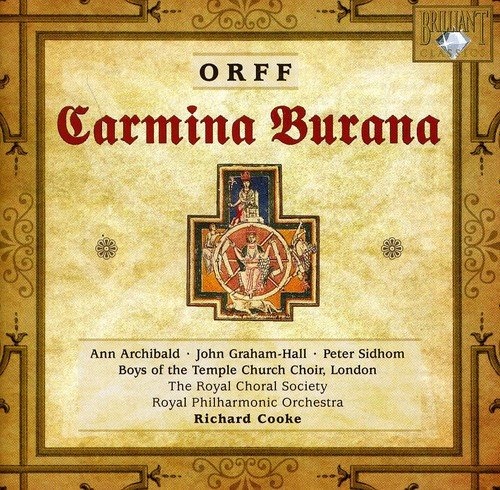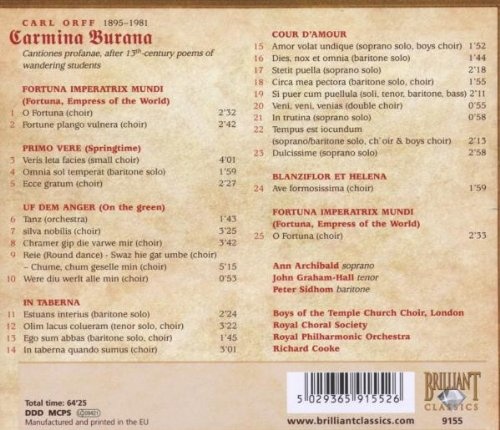
classical music distribution


(Produkt nie został jeszcze oceniony)
kompozytor
Orff, Carl
tytuł
Orff: Carmina Burana
wykonawcy
Royal Philharmonic Orchestra;
Cooke, Richard
Cooke, Richard
nr katalogowy
9155
opis
Carl Orff was born into a distinguished Bavarian military family, and after composing songs in his childhood took up studies at the Munich Academy of Music. His early music shows the influence of Debussy, but this was soon cast off in favour of Richard Strauss and Schoenberg. After his military service in World War I he returned to Munich and became a teacher, eventually establishing the Güntherschule for gymnastics, music and dance. Its aim was to teach and explore new music and dance. In 1930 he produced the pedagogical work Schulwerk upon which his fame rested prior to Carmina Burana. In the late 1920s he came over a collection of Latin stories and poems by a group of renegade 13th century students and monks. These colourful and explicit stories tell of life in the village pub, displays of love – at court and among ordinary folk, and above all how fortune rules our lives and we cannot control where her wheel will stop and the fate she has in store for us all.
nośnik
CD
gatunek
Muzyka klasyczna
producent
Brilliant Classics
data wydania
13-11-2019
EAN / kod kreskowy
5029365915526

(Produkt nie został jeszcze oceniony)
cena 55,00 zł
lubProdukt na zamówienie
Wysyłka ustalana indywidualnie.
Darmowa wysyłka dla zamówień powyżej 300 zł!
Darmowy kurier dla zamówień powyżej 500 zł!
sprawdź koszty wysyłkiProduktu jeszcze nie zrecenzowano, chcesz być pierwszy?
Klienci, którzy kupili ten produkt, kupili również
Bach, Johann Sebastian, Busoni, Ferruccio
Bach - Busoni: Goldberg Variations & other works
CKD 598
Pozostałe płyty tego kompozytora
różni kompozytorzy
Mozart: Symphonies / Schubert: Trout Quintet / Haydn: The Seasons / Mendelssohn: Elias / Orff: Antigonae
PH 12041
różni kompozytorzy
WYCOFANY Günter Wand - The Radio Recordings: Mozart, Messiaen, Beethoven, Stravinsky, Saint-Saëns, Bruckner, ...
PH 13038
Pozostałe płyty tego wykonawcy
Bloch, Ernest
Bloch: Symphony in E flat major; Macbeth - Two Interludes; Three Jewish Poems; In memoriam
8.573290
Beethoven, Ludwig van, Mendelssohn, Felix
Mendelssohn & Beethoven: Violin Concertos
RPO SP 049
Napisz recenzję dla: Orff: Carmina Burana
Zapytaj o dostępność produktu
Twoje zapytanie:
Odpowiemy na adres:
Produkt został dodany do koszyka

Orff, Carl
Orff: Carmina Burana
1 szt












































